Her movies made audiences believe in love, in lust, in the redemptive power of second chances. Romantic comedies, dramas, and thrillers alike carried her presence like a promise that even fractured lives could find connection, that hearts could mend and love could endure. Yet behind the glamorous lens, away from the applause and the flashbulbs, Demi Moore was enduring a reality no script could ever capture, a life written not in dialogue or direction, but in trauma, resilience, and survival.
She was abandoned before she was even born, a harsh beginning that set the stage for a childhood marked by instability and fear. Kidnapped. Forced to extract pills from her mother’s mouth at a young age, navigating a home where chaos and neglect were constants rather than exceptions. By the time she was fifteen, a stranger with a key entered her life, revealing a devastating truth: her mother had allegedly “sold” her. The shock, betrayal, and horror of that revelation carved a fracture deep into her sense of self, a wound that no acclaim or privilege would easily erase. These were experiences that went beyond the reach of any Hollywood storyline, far from the controlled environments of film sets or rehearsed scripts.
Her adolescence and young adulthood were a series of battles against circumstance and despair. Abandoned by her father, pulled through chaos by alcoholic and volatile parents, she confronted the reality that those who were supposed to protect her were often the source of her deepest suffering. The sexual assault at fifteen, combined with the harrowing knowledge of her mother’s betrayal, left scars that would linger long into adulthood. Every relationship, every career choice, every struggle with self-worth was colored by these early wounds.
Yet Moore refused to let herself disappear into the darkness of her past. Dropping out of high school, she fought her way into Hollywood, navigating a world as unforgiving as her own upbringing. Her path was far from linear—addiction, heartbreak, public scrutiny, and the relentless search for love repeatedly threatened to derail her. Marriages, miscarriages, periods of relapse, and estrangement from her daughters were not merely headlines; they were markers of survival, proof of battles fought behind closed doors.
As she rose to the top of her profession, Moore’s struggles became intertwined with her craft. Her performances carried an authenticity and intensity few could match, born from lived experience rather than acting alone. Vulnerability became her strength, pain her tool, and resilience her defining trait. Audiences saw the characters she inhabited, but only she knew the life lessons etched into her performances—the strength drawn from surviving abuse, loss, and betrayal, and the courage to keep moving forward.
Today, at 63, Moore stands sober, celebrated, and active at the pinnacle of her career. Her story is not merely one of survival; it is a testament to the indomitable human spirit. It illustrates that even when childhood is stolen, even when the people who should protect you fail catastrophically, a future can still be fiercely and defiantly your own. She embodies the truth that life’s cruelties, no matter how deep, do not define the totality of a person’s story. They are chapters, not the conclusion.
Moore’s journey is a reminder that strength often wears a quiet face. It does not always announce itself with grandeur or spectacle. Sometimes, it is in the choice to stand again after trauma, to step into the spotlight despite the shadows of the past, and to claim one’s own narrative with clarity and courage. Demi Moore is living proof that pain does not preclude triumph, that survival can evolve into power, and that even the most fractured beginnings can give rise to a life fully lived, unapologetically authentic, and undeniably her own.
